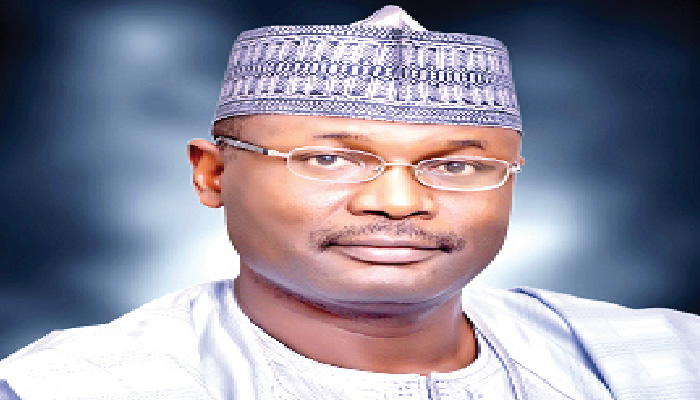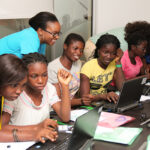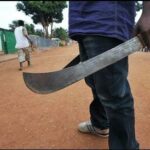
With a consistent awareness campaign and the rush for permanent voter card last year, the 2023 elections were expected to experience a massive turnout of electorate. Instead, the reverse was the case. ADEBAYO FOLORUNSHO-FRANCIS writes on the issue and chronicles the statistics of polling in Nigeria since 1979
The inconsistent turnout of the electorate as well as the voting pattern in the last four decades has always been a source of concern for political stakeholders and international observers.
But when the National Chairman of the Independent National Electoral Commission, Prof. Mahmood Yakubu, mooted the idea of a Bimodal Voters Accreditation System and live transmission of results, he succeeded in raising the hopes of millions of Nigerians.
The INEC boss told those who cared to listen that the technological device, which is specially designed to capture the biometrics of prospective voters and upload polling results, would be a game changer.
Consequently, the zeal to become part of the history makers to decide the next president, state governors, and lawmakers fired up many youths in the country to rush to secure their PVCs.
At one point, INEC acknowledged that the statistics of youths represented the highest number of registered voters who would cast votes in the 2023 general elections.
The National Commissioner of the Commission in charge of the Information and Voter Education Committee, Festus Okoye, predicted that, from available records, young Nigerians would determine the outcome of the 2023 general elections.
He put the figure of youths between 18 and 34 years old at 7,286,871, which represents about 76.56 per cent of the voting population.
But the presidential and National Assembly polls, despite witnessing a number of upsets and surprises, were far from previous showings in terms of voter turnout.
Despite reports that the polls were massively rigged, the 2023 general elections witnessed the lowest voter turnout rate in the country’s history of presidential elections.
Less than 30 per cent, which represents more than 93 million people registered to vote, but only about 25 million of the electorate showed up to vote.
What this simply means is that only two out of every 10 registered voters were at the polling booths to exercise their civic duties.
To be more precise, dating back to the 1979 presidential election using the database from the African Elections, National Electoral Commission, and the Independent National Elections Commission, the trajectory of the electoral processes has proved to be quite unpredictable.
In 1979, the voter turnout for the presidential election was 34.6 per cent. In 1983, the poll witnessed 38.9 per cent; in 1993, (35 per cent); and in 1999 (52.3 per cent).
The year 2003 witnessed a giant leap in the slope of the electoral process when an unprecedented 69.1 per cent of Nigerians across the six geopolitical zones turned out for the April 19, 2003 poll to elect a new president.
The mood at the time was understandable owing to the competitive nature of the electioneering and the huge number of gladiators involved. Former president Chief Olusegun Obasanjo, who won the 1999 election despite being shunned by his people in the South West, was up against the e-military head of state and the incumbent president, Major General Muhammadu (retd.), who has a massive cult following in the North.
Other candidates who contested the election were former warlord and flag bearer of the All Progressives Grand Alliance, Chukwuemeka Odumegwu Ojukwu; his counterpart in the National Conscience Party, Chief Gani Fawehinmi, a human rights lawyer who was then christened ‘Senior Advocate of the Masses;’ popular Pentecostal pastor and Justice Party candidate, Chris Okotie; Jim Nwobodo of the United Nigeria People’s Party; and Sarah Jubril, of the famed ‘one woman, one vote’ who ran on the platform of the Progressive Action Congress.
It was a keenly contested presidential election in which many vexed politicians were determined to ensure that Obasanjo of the Peoples Democratic Party was not returned for a second term in office.
But the result was an emphatic victory for the incumbent president, who defeated his closest opponent, Buhari, by over 11 million votes.
Although he and his party were the clear favourites, he was accused of manipulating the ballot through electoral fraud. Observers reported several incidents where millions of people serially voted. The police in Lagos also raised an alarm over about five million false ballots that they allegedly uncovered.
International observers also reported various irregularities in 11 of the 36 states across the federation. Those ‘isolated incidents’ did not; however, stop Obasanjo from being sworn in as president for another four years.
But there was a drastic downward slide after the 2003 election because the statistics of voters dropped to 57.5 per cent in 2007. By 2011, it had dropped to 53.7 per cent, 43.7 per cent in 2015, 34.7 per cent in 2019, and 27.1 per cent in 2023, an all-time low.
This is in spite of the fact that the current population of the country is about three times its previous size.
What perhaps may appear puzzling, particularly to international election observers in Europe, North America, and Africa, is that the 2023 elections witnessed a more resilient and patient voting population that even remained patient as the vote counting stretched into the early hours of the next day.
However, unlike in the last presidential and National Assembly elections, where residents of each state trooped out with high expectations to vote, the governorship and state assembly polls were abysmal.
In some polling units where voting materials did not arrive on time during the presidential poll, voters waited for several hours just to exercise their rights.
But on March 11, despite voting materials arriving on time and voting commencing early enough, the turnout in many polling units was poor.
A number of factors could, however, be attributed to this development.
As the Centre for Democracy and Development, a pro-democracy think tank, revealed in its report, February 25 presidential election was characterised by violence, vote-buying, and voter intimidation.
Nevertheless, the not-for-profit organisation also conceded that the INEC had improved tremendously in terms of logistics.
If the February 25 elections failed to live up to expectations of the minimum standard required in a democracy, the turnout in the March 11 governorship and state assembly elections was worse.
Political pundits were, however, quick to posit that the voting pattern observed in the presidential election, where opposition blocs and less fancied candidates dominated the ballot, provoked some bigwigs, incumbent governors, and mega politicians to fortify their strongholds.
To achieve their aim, they resorted to a series of acts of violence on the eve of the election and intimidation of voters with the threat to harm people who voted against their candidates.
The fear of violence, as witnessed in some instances where some people were injured, stabbed in the face, or shot, forced many voters to stay away from the polling booths on election day.
In its report two weeks ago, the CDD observed that “those who are participating appear to be more open to inducement for casting their ballot, with vote trading being undertaken by all political parties across Nigeria’s six geo-political zones.”
Yiaga Africa, another notable NGO, reported 15 confirmed cases of vote buying across eight states where governorship and state assembly elections were exercised. Yiaga also noted several cases of infractions and non-compliance with the 2022 Electoral Act.
“The voters hand over their ballot papers to party agents in exchange for the bribe,” the press statement by Yiaga Africa stated, specifically noting how the All Progressive Congress and the People Democratic Party were observed sharing food, cash, and alcoholic drinks with some voters in different states.
Some of those who voted in the last election but didn’t turn out for the state elections took to several social media platforms to say they have lost hope and trust in the capacity of INEC to conduct free and fair polls.
Many of those who had high expectations that the commission would use the presidential poll as a dress rehearsal for seamless governorship and state assembly elections were equally disappointed by the outcome.
Not taking anything away from the polls, there were pockets of reports that the excruciating pain of the cash squeeze brought about by the naira swap policy of the Central Bank of Nigeria also played a big role in the voter apathy noticed across the country.
A considerable number of Nigerians who were understandably disappointed with the system did not see any need to troop out to exercise any form of civic responsibility. The surprise of surprises, some youths were seen playing football on deserted streets while local traders were also spotted displaying their wares with little or no interest in people moving around with PVCs.
These dejected few would rather seek to raise income to feed some of the hungry mouths back home than be bothered about any electoral exercise that would usher in any form of good governance.
As it turned out, the electoral umpire also found itself struggling with logistic problems arising from faulty BVAS machines, late arrival of election materials, and ad hoc staff, as well as setting up in the wrong locations.
It also failed to meet the yearning expectations of the young voting population by failing to transmit the election results in real-time as it earlier promised.
The overall performance of INEC and disturbing acts of violent voter intimidation and suppression reported in Lagos, Kano, Rivers, Edo, and Delta States left the United States and Britain deeply troubled.
It has also led to calls by concerned Nigerians and the international community for foreign missions and embassies to deny and slam visa restrictions on politicians and individuals, including state and non-state actors, who are found responsible for, or complicit in, undermining the democratic process in Nigeria.





